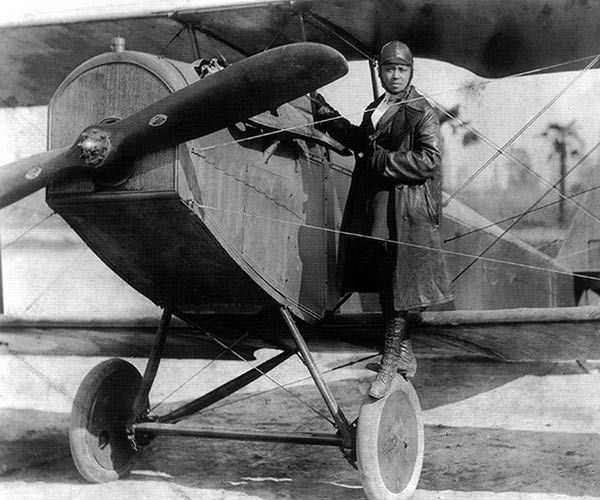By Alia Pappas
The year is 1925. Imagine the wind is at an easy three knots. Above the dusty runway, there is little cloud cover. Visibility is high. Conditions for achieving uncommon dreams are optimal. The yoke of the familiar Jenny airplane is comfortably well-worn beneath the palms of one driven, determined woman from little Atlanta, Texas, who became the first licensed African-American pilot in the world.
Bessie Coleman was born in 1892 to low income sharecropper parents in Atlanta where profits were made by lumber, oil, or railroad workers, not by those who grew cotton.
Bessie was quoted saying she wanted to “amount to something,” a feat difficult to accomplish when facing segregation. Hoping for better prospects elsewhere, Bessie’s father soon uprooted his family, moving to Waxahachie.
According to the Atlanta Historical Museum, Bessie began her education at an African American elementary school, making the four-mile trek to the schoolhouse every day. When she was not at school, Bessie was tending her mother’s garden, performing mandatory chores around the household, or watching her sisters.
Exasperated by the racial discrimination prevalent in the South Bessie’s father left his family in 1901. Bessie’s brothers also left, leaving the Colemans without a man of the house and an irreparably broken home. Their absence left Bessie with several responsibilities, including working during the cotton harvest.
Bessie completed all eight grades of schooling offered in Waxahachie. She used her savings to attend the Colored Agricultural and Normal University in Langston, Oklahoma, but returned home when her money fell short of tuition requirements. She worked as a laundress until she joined her brother, Walter, in Chicago. The remainder of Bessie’s family followed subsequently.
While in Chicago, Bessie worked as a manicurist, and briefly ran a chili parlor. Bessie was skillful in many fields, but was determined to continue to strive for goals bigger than her, even if she had not yet realized the extent of those wishes.
Bessie’s dreams of flying derived from her brother John’s teasing. He heard of French ladies becoming professional, self-sufficient airplane pilots. While her brother found this hilarious, Bessie found these women inspirational, deciding aviation was her career destination.
Bessie returned to the United States as the first licensed African American pilot. She performed in air shows, earning the nickname “Brave Bessie” because of her fondness for daredevil stunts.
At her first air show in 1922, she performed as the “World’s Greatest Woman Flyer,” and encouraged other women and African Americans to fight for their dreams despite social hindrances. Bessie refused to perform unless all members of the audience entered through the same gates. Bessie also gave lectures and flight lessons during her travels, and wished to open an aviation school.
Bessie’s efforts were halted when she died due to a plane malfunction on April 30, 1926. During a new plane’s test flight, her mechanic lost control of the aircraft. Bessie fell from the cockpit to her death.
Bessie’s legacy of striving for excellence in the face of adversity lives on. Her historical significance was highlighted in 1995 when the U.S. Postal Service issued a commemorative stamp in her honor.
Many aviatrixes are under Bessie’s influence. The Bessie Coleman Aero Club, headquartered in Los Angeles, was created shortly after Besssie’s death by William J. Powell. Bessie is commemorated by the Bessie Coleman Aerospace Legacy, a nonprofit foundation located in Washington D.C. These organizations continue to inspire pilots to reach for the skies as Bessie did in her life.
The Atlanta Historical Museum is located at 101 North East Street in Atlanta, Texas. They are open from 1 to 4 p.m. Monday through Friday. Call 903.796.1892 for more information.


